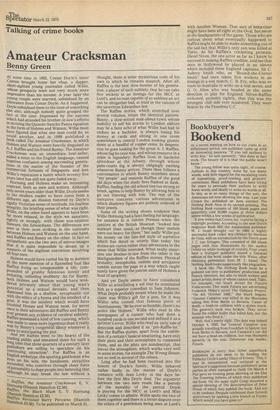Bookbuyer's
Bookend
At a recent meeting on how to cut costs in an inflationary period, one publisher came up with an interesting panacea. "If you tell authors to write lass," he said earnestly, "this does in fact work. The beauty of it is that the public won't know."
The young fellow was quite right, of course. Authors in this country write far too many words, with little regard for the escalating costs of typesetting, proof-reading and printers' corrections. Many publishers have been trying for years to persuade their authors to write fewer words, and ideally to write no words at all. In this, as in so many things of the sort, the Americans are now showing the way. Last year Crown Inc. published an item entitled The Nothing Book. Now in its second printing, The Nothing Book consists of 160 blank pages and apparently sold 25,000 copies at three dollars apiece within a few weeks of publication.
It now seems that Crown Inc. could be facing a copyright problem. According to the new Dutch magazine Book Miff the Amsterdam publisher M. J. Israel brought out in 1963 a highly successful book called Wit (White) by Herman de Vreis, with an introduction by the Dutch poet J. C. van Schagen. This consisted of 200 blank pages with four illustrations by the author (white on white montage of course). Four years later a Stuttgart publisher issued a German edition of the book under the title Weiss, after obtaining permission from M. J. Israel. The Nothing Book looks suspiciously like plagiarism.
A book like The Nothing Book must be a godsend not only to publishers' production and finance directors, but also to blurb writers and jacket artists, many of whom cannot read. Take, for example, the blurb writer for Futura Publications. This week Futura are advertising Frederick Nolan's novel The Oshawa Project. "On 4th October 1995," the blurb begins, "General Campion was killed in the Mercedes taking him from Berlin to Bavaria. Cause of death: a head-on collision with a stolen truck. The general's neck was broken. They never found the rubber bullet that killed him, nor the assassin who fired it."
Well, that's nearly right. The date was indeed October 4, 1945, but General Campion was actually travelling from Frankfurt to Speyer, not from Berlin to Bavaria. And Campion's car did not have a head-on collision, but was thumped squarely in the rear. Otherwise top marks, Futura.
Bookbuyer is sorry that other paperback publishers do not seem to be heeding the Publicity Circle's useful 'Diary of Events.' This, it may be remembered, was initiated at the Spectator's suggestion because publishers press parties so often managed to clash. On March 4 Pan gave an evening press showing of the film The Towering Inferno, of which they published the book. On the same night Corgi mounted a special showing of The Reincarnation of Peter Proud, of which they publish the book. And not to be outdone, Penguin celebrated their fortieth anniversary by opening new branch at Foyles. Which would you have gone to?


































 Previous page
Previous page